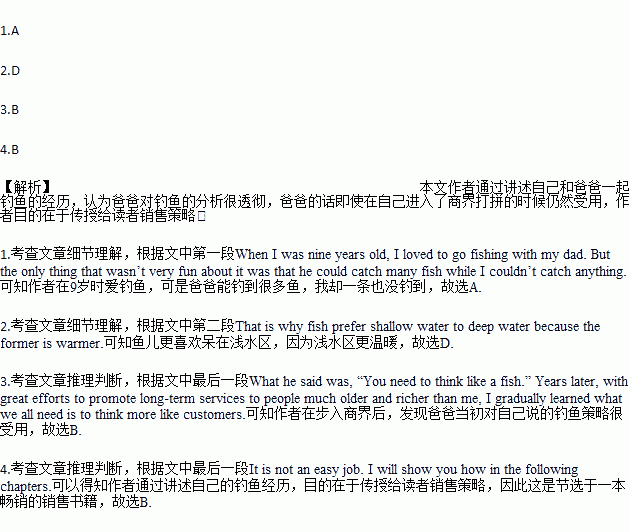题目内容
When I was nine years old, I loved to go fishing with my dad. But the only thing that wasn’t very fun about it was that he could catch many fish while I couldn’t catch anything. I usually got pretty upset and kept asking him why. He always answered, “Son, if you want to catch a fish, you have to think like a fish”, I remember being even more upset then because, “I’m not a fish!” I didn’t know how to think like a fish. Besides, I reasoned, how could what I think influence what a fish does.
As I got a little older I began to understand what my dad really meant. So, I read some books on fish. And I even joined the local fishing club and started attending the monthly meetings. I learned that a fish is a cold-blooded animal and therefore is very sensitive to water temperature. That is why fish prefer shallow water to deep water because the former is warmer. Besides, water is usually warmer in direct sunlight than in the shade. Yet, fish don’ t have any eyelids(眼皮) and the sun hurts their eyes… The more I understood fish, the more I became effective at finding and catching them.
When I grew up and entered the business world, I remember hearing my first boss say, “We all need to think like sales people.” But it didn’t completely make sense. My dad never once said, “If you want to catch a fish you need to think like a fisherman.” What he said was, “You need to think like a fish.” Years later, with great efforts to promote long-term services to people much older and richer than me, I gradually learned what we all need is to think more like customers. It is not an easy job. I will show you how in the following chapters.
1.Why was the author upset in fishing trips when he was nine?
A. He could not catch a fish.
B. His father was not patient with him.
C. His father did not teach him fishing.
D. He could not influence a fish as his father did.
2.According to the author, fish are most likely to be found _________.
A. in deep water on sunny days
B. in deep water on cloudy days
C. in shallow water under sunlight
D. in shallow water under waterside trees.
3.After entering the business world, the author found _________.
A. it easy to think like a customer
B. his father’s fishing advice inspiring
C. his first boss’s sales ideas reasonable
D. it difficult to sell services to poor people
4.This passage most likely comes from _________.
A. a fishing guide
B. a popular sales book
C. a novel on childhood
D. a millionaire’s biography(自传)

